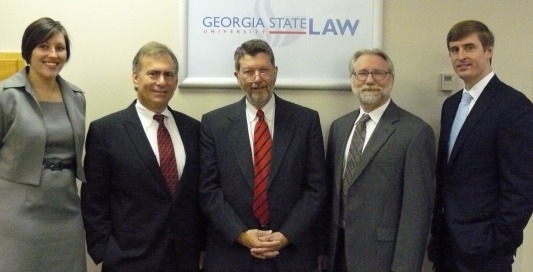Center for Law, Health & Society | News and Events | Center News | 2011 Archive | Law Students Host Experts on Health Reform Law Students Host Experts on Health Reform
May 2, 2011
ATLANTA -- The Student Health Law Association (SHLA) hosted three prominent speakers during Law Week 2011 on "The Impact of Health Care Reform on Employers." The April 7th event was co-sponsored by the Labor and Employment Law Society, the Public Interest Law Association, and the Business and Law Society.
 Randall L. Hughes, Faculty Fellow with the Center for Law, Health & Society, moderated the speakers’ discussion of key issues that confront employers when deciding whether to insure their employees and how the 2010 health care reform law, the Patient Protection and Affordable Care Act (PPACA), impacts employers’ decisions.
Randall L. Hughes, Faculty Fellow with the Center for Law, Health & Society, moderated the speakers’ discussion of key issues that confront employers when deciding whether to insure their employees and how the 2010 health care reform law, the Patient Protection and Affordable Care Act (PPACA), impacts employers’ decisions.
"We cannot control health care costs until everyone is covered, and we cannot get everyone covered until we change how health care is financed," said William Custer, Ph.D., a health economist and associate professor with Georgia State’s Institute of Health Administration. Currently, the large majority of insured Americans purchase health insurance through their employer. According to Custer, however, "this system of employer-sponsored coverage is eroding."
Custer said that the biggest change for employers under PPACA would be the creation of health insurance exchanges. These exchanges will allow consumers to shop for a plan that meets certain cost and benefit standards from a variety of insurers through an online portal.
Jason E. Bring, a Georgia State Law graduate (Class of 1998) and partner with Arnall Golden Gregory LLP, said that the central change under PPACA is the individual mandate requiring that all Americans above a certain financial threshold have health insurance or pay a tax penalty.
"The constitutionality of this mandate is being challenged in court under the commerce clause on the theory that the federal government cannot force consumers to enter the stream of commerce," Bring explained. "If the mandate is successfully challenged, the entire health reform legislation may fail because PPACA lacks a severability clause, a key provision that would have ensured that if one part of the bill is declared unconstitutional, the rest of it remains valid."
Steven G. Schaffer, a partner with Bryan Cave LLP, said that the primary issue for employers under PPACA is the pay-or-play mandate requiring large employers to offer health insurance to their employees or pay a tax penalty. Employers face a financial penalty if they do not provide minimum essential health coverage and an employee eligible for government assistance must sign up on the health insurance exchange.
"It is unclear whether grandfathered, self-insured plans are subject to this regulation," said Schaffer. Plans created prior to March 23, 2010 may be grandfathered under PPACA and exempt from many changes under the law. Health plans lose their grandfathered status if they increase costs or reduce benefits for consumers. "Because there are only minor, if any, savings for grandfathered plans," Schaffer said, "I think in a few years most employers will not choose to retain any grandfathered plans."
A large audience of law students and faculty attended the event, which was publicized as one of the premier events of Law Week. "Our panelists provided valuable insight from the front lines of the health reform debate," said Hughes. "The academic community appreciated learning about the real-world impact of the law from those implementing it."
Each spring the College of Law hosts Law Week as an extension of Law Day, which was established by Dwight Eisenhower in 1958 "to remind us all that we as Americans live, every day of our lives, under a rule of law." Student organizations arrange speaker programs throughout the week on current legal issues, often pulling topics from recent news headlines.
"This fascinating panel offered a wonderful conclusion to SHLA’s activities this year," said Megan Daugherty, a second-year law student and SHLA President who secured the speakers and made the arrangements for the program. "There is such a wealth of expertise in health law in our community, and we’re grateful for the speakers’ willingness to share it with us."